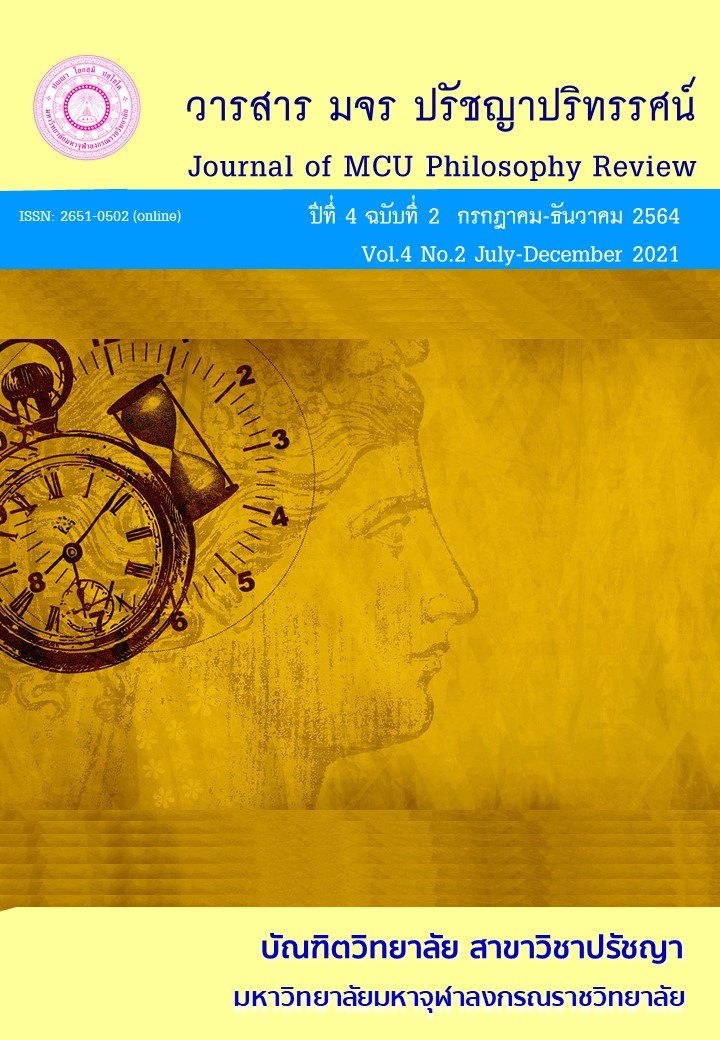Guidelines that government ought to follow while legally dealing with Buddhist monks who hold the statuses accorded to Dhamma and Vinaya and citizen of the state
Main Article Content
Abstract
The essential constituent of the state is the citizen in which two statuses, a civil citizen and a member of religion, are consisted. As a result, there appears certain relationship between the status of being a civil citizen and a member of religion. A question is asked that what kind of action the state ought to do while legally deals with people who hold two statuses. In this paper, two reasons were proposed to deal with them as follows: the first the state ought to deal with people who have two statuses as per the prescribed law being enforced to people in general, the second is that people, Buddhist monks, for instance, who possess two statuses are regarded as having more special status than other and then the heavy degree of treatment should be made to them more than other because they are apparently held as the social and moral model. Based on this, the heavier price should be paid by them than other as well. It was purposely made to propose that the government ought to treat people who have two statuses as per the prescribed law as did to general people because Buddhist monks share the highest legal status given by the state. This paper is reasonably claimed that to base Buddhist monks on the ground that since they are regarded as the social and moral model and then they in wrong doing deserve to be treated heavier than other is not morally justified at all. In this, firstly, the reason why they ought to be legally dealt with is because of its legitimacy it would bring about to the state since Buddhist monks become a social model, and secondly, if the state treats people who have two statuses like Buddhist monks heavier than people in general and thereby illegitimacy of the law would be caused by the state where the civil disobedience would be also precipitated. Therefore, it becomes necessary for the state to comply equally with the prescribed law. As regards Dhamma and Vinaya, they are objectively laid down to be the regulation for Buddhist monks’ ways of living life in which punishment is accorded to own nature; it should not be intervened by the state.
Article Details
บทความที่ได้รับการตีพิมพ์เป็นลิขสิทธิ์ของวารสาร มจร ปรัชญาปริทรรศน์
ข้อความในบทความที่ได้รับการตีพิมพ์ในวารสาร ถือเป็นความรับผิดชอบของผู้เขียนบทความ และข้อคิดเห็นนั้นไม่ถือว่าเป็นทัศนะและความรับผิดชอบของกองบรรณาธิการวารสาร มจร ปรัชญาปริทรรศน์
References
ดำรงค์ ฐานดี. (ม.ป.ป.). ความรู้เรื่องสังคมและวัฒนธรรม. คณะมนุษยศาสตร์ มหาวิทยาลัยรามคำแหง.
นิธิ เอียวศรีวงศ์. (2558). ศาสนากับรัฐธรรมนูญฉบับวัฒนธรรมไทย. กรุงเทพมหานคร: คณะศิลปะศาสตร์ มหาวิทยาลัยธรรมศาสตร์.
ประเวศ อินทองปาน, พระครูวิศาลชัยธรรม, พระมหาสมปอง ฐานิสฺสโร. (2015). การศึกษาบทบาทในการทำนุบำรุงพระพุทธศาสนาของพระเจ้าอชาตศัตรู. วารสารมหาจุฬานาครทรรศน์, 2(1), 1-7.
พระครูนนทมงคลวิศิษฐ์. (2016).พระสงฆ์กับบทบาทการพัฒนาที่เปลี่ยนแปลงไปตามยุคสมัย. วารสาร มจร การพัฒนาสังคม, 1(2), 20-30.
พระมหาหรรษา ธมฺมหาโส. (2553). พระพุทธเจ้าในฐานะนักเจรจาไกล่เกลี่ยคนกลาง. กรุงเทพมหานคร: มหาวิทยาลัยมหาจุฬาลงกรณราชวิทยาลัย.
โธมัส เพน. (2563). สามัญสำนึก Common Sense. แปลโดย ภัควดี วีระภาสพงษ์. กรุงเทพมหานคร: บุ๊คสเคป.
มหาจุฬาลงกรณราชวิทยาลัย. (2539). พระไตรปิฎกภาษาไทย ฉบับมหาจุฬาลงกรณราชวิทยาลัย. กรุงเทพมหานคร: โรงพิมพ์มหาจุฬาลงกรณราชวิทยาลัย.
ส.ศิวรักษ์. (2547). บทบาทของพระสงฆ์ในสังคมปัจจุบัน. นิตยสารศิลปวัฒนธรรม, 25(10), 2-4.


